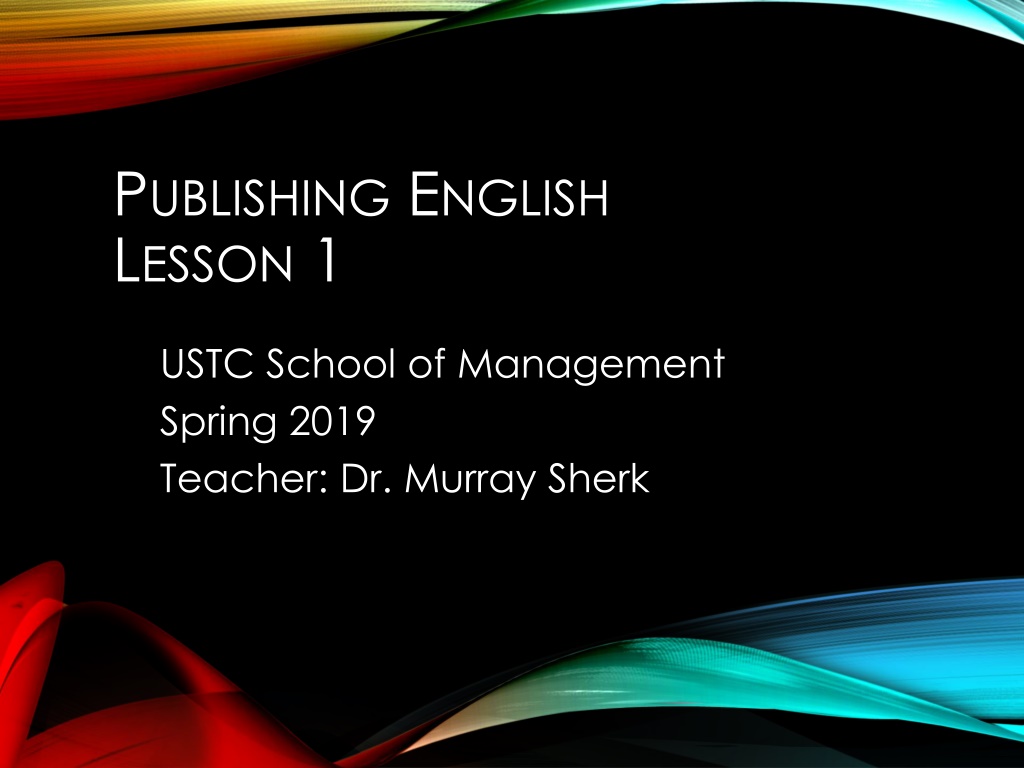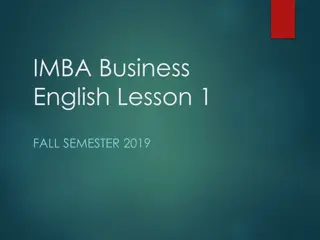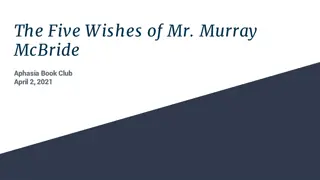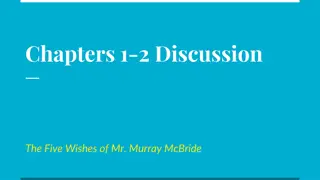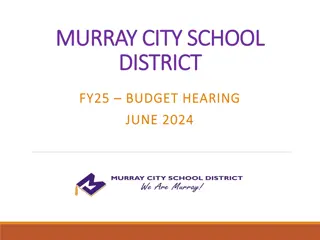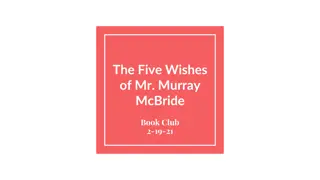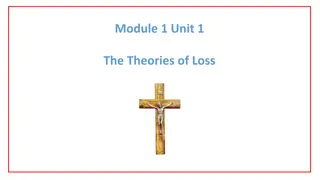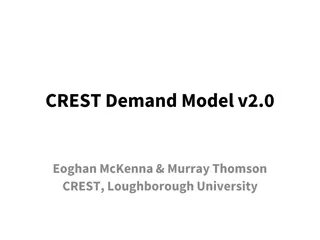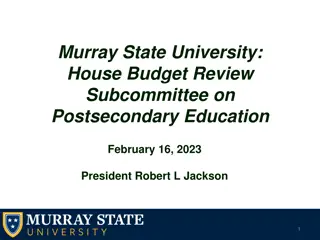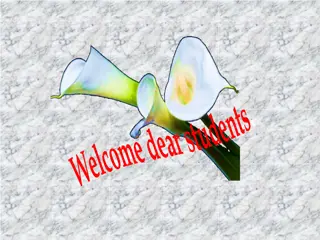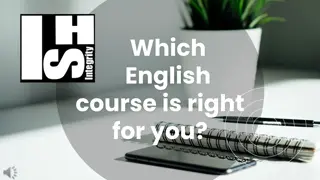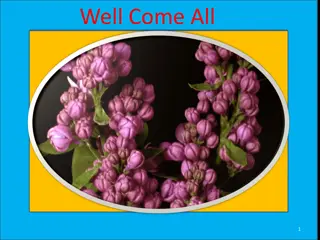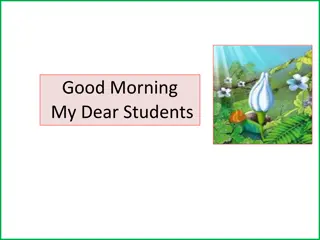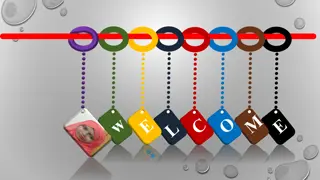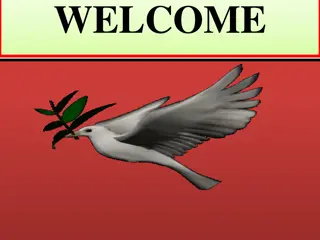English Lesson 1 at USTC School of Management with Dr. Murray Sherk
Join Dr. Murray Sherk's English Lesson 1 at USTC School of Management to learn about research, publishing, logical arguments, and more. Explore mind mapping, meet the renowned teacher, get involved in a writing project, and find out the schedule for classes. Make sure to have a device for computer use in class and be prepared for an inspiring semester ahead.
Uploaded on Sep 23, 2024 | 0 Views
Download Presentation

Please find below an Image/Link to download the presentation.
The content on the website is provided AS IS for your information and personal use only. It may not be sold, licensed, or shared on other websites without obtaining consent from the author. Download presentation by click this link. If you encounter any issues during the download, it is possible that the publisher has removed the file from their server.
E N D
Presentation Transcript
PUBLISHING ENGLISH LESSON 1 USTC School of Management Spring 2019 Teacher: Dr. Murray Sherk
LESSON 1 OUTLINE Course introduction and syllabus Our profession as writers The research and publishing game Logical arguments and argument strategies Mind Mapping / Concept Mapping
ACTIVITY 1: COURSE INTRODUCTION AND SYLLABUS Course Website; access via: http://staff.ustc.edu.cn/~msherk Syllabus Sheet: Download from website Highlights are on the following slides
ABOUT YOUR TEACHER MURRAY Please call me Murray From Canada PhD in theoretical Computer Science from U. Toronto in 1989 Taught CS in Canada 4 years 19thyear teaching at USTC Involved in publishing >250 papers since Jan 1, 2016 through editing and polishing
ABOUT YOUR TEACHER MURRAY Please call me Murray http://staff.ustc.edu.cn/~msherk msherk@ustc.edu.cn
Murray Sherk Front Murray Write the corresponding information for you on your card in the appropriate places. Intelligence Test: Leave room for your photo. BZ13027783 msherk@ustc.edu .cn Computer-aided language learning, data structures and algorithms Toronto, Canada An interesting thing about me is that I program computers for fun I love the creativity involved in it. Back
WRITINGPROJECT During this semester, you will be working on one of your research results, turning it into a paper fully edited and polished, ready to submit to a top-ranked journal. Currently working on one? Good! whether just starting, midway, or almost done Just finished one? Start a new one This is your writing project for this course.
SCHEDULE: CLASSES Monday mornings: March 11, 18, 25; April 1, 8, 15, 22, 29 9:00AM to 12:15PM Final Exam: Time & Date to be determined
USEOF COMPUTERS You must have some device in class that will let you run a web browser. E.g. read articles from the Internet The device should also let you write/create documents in the workshop Best option: portable Windows computer You will need MS Word or another editor You will need to install some free programs and/or sign up for some free web services.
HOWYOUGETYOUR GRADE 20% Attendance and participation Attend eight classroom lessons Participate in class/workshop activities 30% Homework Writing project & reports Individual assignments 50% Final exam
FINAL EXAM (WORTH 50%) Covers Knowledge of class material Practical editing/proof-reading Short writing task (<250 words) During the exam You may use computer, books, notes, all tools you want, except You may not communicate with other people nor copy their writing
ACTIVITY 2: OURPROFESSION What is your professional goal? University professor? Researcher? Scholar? Academic?
COMPLETETHISSENTENCE: The most important tool for success as a researcher is _____________________. How about writing ?
OURPROFESSION What is your professional goal? University professor? Researcher? Scholar? Fully participating internationally requires publishing
OURIDENTITYASWRITERS We re not just scholars who sometimes write Writing is part of being a scholar Writing must be part of our identity You are a professional writer.
WISEWORDSFROM GREEK PHILOSOPHER ARISTOTLE (384-322 BCE) We are what we repeatedly do. Excellence, then, is not an act, but a habit.
WISEWORDSFROM U.K. PROF. C. S. LEWIS (1898-1963) What you want is practice, practice, practice. It doesn t matter what we write so long as we write continually as well as we can. I feel that every time I write a page either of prose or of verse, with real effort, even if it s thrown in the fire the next minute, I am so much further on.
DEEPPRACTICEANDMYELIN Physiological basis for practice makes perfect 1. Every movement, thought, feeling is electrical signal in brain along a neuron pathway = circuit of nerve fibers 2. Myelin = insulation wrapping fibers. More myelin brings more signal strength, speed, accuracy. 3. The more a circuit fires, the more myelin develops.
WHATISDEEP PRACTICE? Deliberate Targeted, focussed repetition Persistent correcting of mistakes Goal in mind: Improve performance! Think!
BECOMINGAN ACADEMIC WRITER: 50 EXERCISESFOR PACED, PRODUCTIVE, AND POWERFUL WRITING BY PATRICIA GOODSON Research examining productive faculty s habits consistently point to scheduled and protected writing time as a key element for success.
STUDYPARTICIPANT KAREN HARRIS, QUOTEDBY PATRICIA GOODSON The trick is that research and writing time belong on your calendar An author must write in the calendar time to write and do research you must protect this time just as if it were a meeting that you could not reschedule.
PRACTICAL APPLICATION: YOUR COURSE PROJECT Choose 1 hour in your weekly schedule to reserve for working on your course project. Same time, each week You cannot change this appointment! You MUST write then, each week! At least 30 minutes must be spent actually generating, editing, or polishing your text, but related tasks (e.g. trying out a new writing tool) can also be done. Send a report by email to me each week after you do your scheduled hour. Reports are worth 12% of your final grade!
PRACTICAL APPLICATION: YOUR COURSE PROJECT 8 Homework Assignments each worth 1.5% Each week, starting before next class, report to me what you did in your scheduled writing time 100-word report by email (80-120 words) a description of what you did. Do not send the manuscript text! Use full sentences in your report. Try to write clearly, concisely, and well.
EXAMPLE REPORT 1 Report #1: Thursday, March 14, 1:45-2:45 1. This week I tried out EndNote for 20 minutes to see if it would help me organize my way of handling citations and references. I ended up concluding it would work but I need to learn more about it. 2. I generated text for my writing project about the effect of family incivility on voter turnout in elections in South Africa. I worked mostly on the Conclusion section, summarizing the contributions of my paper but I took a lot of time to think through and list the limitations of my work.
EXAMPLE REPORT 2 Report #2: Thursday, March 21, 1:45-2:45 My project paper combines results from a survey I do and some government reports on voter turnout at elections. Today I worked for about 20 minutes on the introduction but then I got frustrated so I switched to working on the literature review. I tried using cMapTools to design the literature review using a concept map. It felt a bit like I was wasting time but I guess it helped me get started and avoid writer s block.
EXAMPLE REPORT 3 Report #3: Thursday, March 28, 1:45-2:45 I worked the entire time on editing and polishing my Introduction section. Grammarly helped me find some grammar mistakes and some spelling problems. Also, it turns out that I mix British and American English spelling so I need to choose one or the other. I prefer British style but I tend to use American quotation mark style; I must be more careful about that. I also found places where I could make my meaning more specific and clear by rewriting, so I changed those. I found 15 places where I used it but it was not clear what it referred to. I m adding this to my checklist of things I need to check in my writing.
EMAILTHE WEEKLY REPORTS to msherk@ustc.edu.cn with Subject line: Project report #x (x = 1, 2, 3, ) I need a report from you each week. Email it soon (<12 hours) after you do your scheduled project session. (If you wish, you may spend 10 minutes of your project hour writing the report, but not more than that.)
ACTIVITY 3: THERESEARCHAND PUBLISHINGGAME This is now a part of your life. Get used to it!
WHATEVERYGRADSTUDENTANDPROFESSOR HASTODEALWITH:
MAYBESOMEWHOPUBLISH ACTUALLYDESERVETODIEFOR HOWTHEYWRITE? The third major component of modeling phenomena involves the utilization of symbolic representations of modeled patterns in the form of imaginal and verbal contents to guide overt performances. It is assumed that reinstatement of representational schemes provides a basis for self-instructions on how component responses must be combined and sequenced to produce new patterns of behavior.
THE TRICK: SOUNDSCHOLARLY BUTNOTPRETENTIOUS Use good vocabulary, but don t sound like you re showing off Use precise terminology of your research area, but avoid overuse of jargon. How?
HOW? KNOW, USE, CHECK Know what you re aiming for and what mistakes to avoid Use tools that will help Check and edit your writing (with a skeptical eye!)
KNOW: HOWDOWEGETSTARTED WRITING? AVOID WRITER S BLOCK? Three separate tasks are involved in writing 1) Generation of text 2) Editing of generated text 3) Proof-reading Often some of 3 is done during 2, but 2 focuses on English correctness and 3 focuses on style and logic.
GENERATINGTEXTUSINGA COMPUTER Open a text editor on your computer On the topic of interest, just start typing your ideas in sentences. Do not correct spelling, grammar, logic, ideas, Try making the edit window small so you cannot see what you re typing. Goal = produce lots of text with many ideas. (Ideas generate more ideas)
WHATTHISCOURSESHOULDBE For this new course I want to teach students how to be professional. Also, they need more nuts and bolts. The textbook (should I use it as a textbook?) says we are professional writers. I emphasize professional. Sutdents need to be more careful with scholarship. Sometimes they use words for words sake. Good vocabularly is important but should be a tool that is no overused.
WHATTHISCOURSESHOULDBE For this new course I want to teach students how to be professional. Also, they need more nuts and bolts. The textbook (should I use it as a textbook?) says we are professional writers. I emphasize professional. Sutdents need to be more careful with scholarship. Sometimes they use words for words sake. Good vocabularly is important but should be a tool that is no overused.
GENERATING TEXTUSING PAPER Start with a blank piece of paper. On the topic of interest, just start writing your ideas, using sentences Do not correct spelling, grammar, logic, ideas, spacing, Messy writing is OK if it is readable Goal = produce lots of text with many ideas. (Ideas generate more ideas)
TOPIC: ADVICEFORNEWLYARRIVING USTC GRADSTUDENTSFROMMYCOUNTRY Using paper, generate text for a short article about this topic for 5 minutes Just start writing your ideas in sentences. Do not correct spelling, grammar, logic, ideas, spacing, Messy writing is OK if it is readable Goal = produce lots of text with many ideas. (Ideas generate more ideas)
TOPIC: ADVICEFORNEWLYARRIVING USTC GRADSTUDENTSFROMMYCOUNTRY Using a new sheet of paper, write an edited version of the first sheet. Take 10 minutes. Fix any problems you see: spelling, grammar, logic, ideas, spacing, Add / change / delete material Check / fix the logic Look up vocabulary words if necessary
TOPIC: ADVICEFORNEWLYARRIVING USTC GRADSTUDENTSFROMMYCOUNTRY Label the 2 sheets as Versions 1 and 2 Write your name at the top of both. Hand these both in now. (This is diagnostic it will not count in your grade.)
ACTIVITY 4: LOGICALARGUMENTS ANDARGUMENTSTRATEGIES All published articles are arguments. Successful scholarly writers make convincing arguments.
STRATEGIESFOR ARGUMENTS Argument = claim + reasons and evidence ( Argument = conclusion + premises ) 1. Is the claim clear? 2. Are these good reasons to accept the claim? 3. Is there enough evidence to accept the claim (without exceeding the time/space you have)?
STRATEGIESFOR ARGUMENTS Logic & Reason objective facts plus logical thinking Character & Credentials I m honest I m telling the truth I know what I m talking about They are honest and can speak with authority, and they believe this Partly subjective, but expert opinion Emotion fear, love, respect, loyalty, patriotism
CLAIM: YOUSHOULDSCHEDULEA TIMETOWRITEEACHWORKDAY. Emotion Do it or you will fail as a scholar! Do it and Murray will give you a high mark in this course, which will make your mother proud of you.
CLAIM: YOUSHOULDSCHEDULEA TIMETOWRITEEACHWORKDAY. Emotion Do it or you will fail! Character & Credentials Accomplished scholar Patricia Goodson of Texas A&M university strongly recommends this in her book Becoming an Academic Writer. Many successful academic writers say the key to success is to write extensively, and that a large amount of writing time is needed to become an expert.
Claim: You should schedule a time to write each workday. Emotion Do it or you will fail! Character & Credentials Successful academic writers say Logic & Reason In many areas of life, practice makes perfect so you need to practice a lot. Research on myelin confirms this. In the busy life of a scholar, things that are not scheduled get put aside easily, so you should give your writing time the priority of a meeting with a person.
SCHOLARLY ARGUMENTS Use L&R for 90% or more of evidence C&C is used some for motivation in the literature review part of the paper Particularly if the paper responds to a specific challenge: Pioneer researchers Jones and Finn stated that understanding this factor is crucial. Emotion can be used to motivate, but is considered very weak Often because it is just your subjective opinion that this research is vital! (so you get your PhD?)
ARGUMENT STRATEGY EXERCISE Working with your partner(s), figure out how to use all 3 strategies to argue that the following claim is true: Claim: Intelligent beings from outer space have visited Earth.
